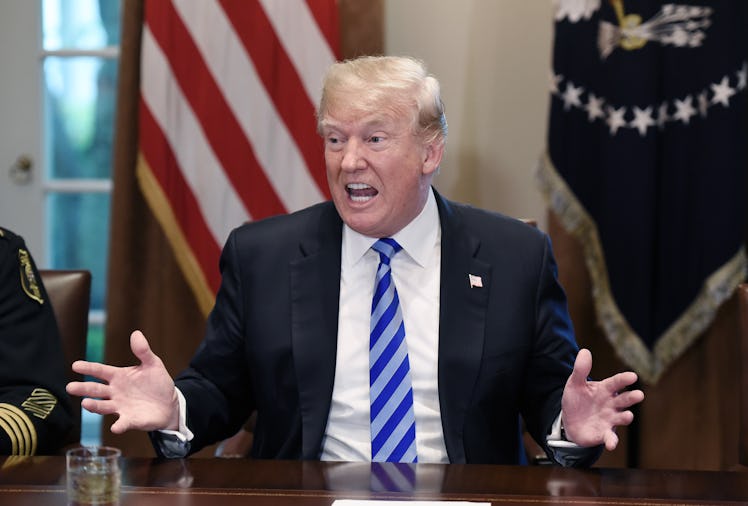
No, Trump Didn't Call All Illegal Immigrants "Animals" & Yes, The Context Matters
Another one of those moments where the president speaks irresponsibly about immigrants came on Wednesday, May 16. By now you may have heard about it, but you might not have gotten the full context. That's because Donald Trump's "animals" comment about illegal immigration has generally been a bit misreported, and that very important fact should matter most to his critics, for one big reason.
The moment came during a roundtable meeting at the White House on illegal immigration, when Trump said at one point, "These aren’t people. These are animals." That quote is now pretty well known, but the actual context, not so much: The president made that remark after a sheriff had specifically been talking about tracking down MS-13 gang members. The gang is believed to have been behind 25 killings on Long Island since 2016, according to NBC News.
It is safe to say that news outlets could have done a little better in making that bit of context clear. That much is made obvious by the way notable media members like CNN's Jake Tapper seemingly played clean-up for his peers the morning after by posting a full transcript on Twitter. The Associated Press even issued a correction of how it framed the quote, "because it wasn’t made clear that he was speaking after a comment about gang members."
By that time, though, the lost context had been reflected by the type of criticism the comment received.
Eric Swallwell, a Democrat in Congress, tweeted on Wednesday, "If you are a decent person and were in a meeting where [Donald Trump] called immigrants 'animals,' you will denounce him NOW. Otherwise, what makes you any different?" Swallwell was far from alone in criticizing Trump's quote, while definitively framing the quote as a comment on all illegal immigrants in general.
That framing is what drew a different type of criticism, from people charging that Trump's words were being willfully taken out of context. Most notable is that among those second group of critics were conservatives who are Trump skeptics.
"I beg for my conservative friends to be honest about his shortcomings, & then you people come in [with] this complete, abject nonsense," David Bahnsen, a contributor for conservative magazine National Review, tweeted Wednesday. "That is not what he said, and you know it. Your indefensible lies feed the Trumpian wave. There was no ambiguity that he was talking about MS-13."
Therein lies the "big reason" Trump critics should be on their toes. There's not exactly a shortage of conservatives and people within Trump's own party who lack enthusiasm for the president.
But when scrutiny of the president seems sloppy or needlessly exaggerated, it undermines the legitimate reasons for scrutiny itself.
That's not to excuse the president, either, who has a history of (at best) consistently clumsy rhetoric on immigration. Make no mistake, we are here because of what Trump said above all.
While it's obvious that the context of his comments were lost in the tweets and reporting, it's also questionable to say that he was "clearly" solely talking about MS-13 gang members. There was little clear about what Trump said, in fact, which is often the case.
Just look at the whole of his comment. First, a sheriff notes, per White House records, "There could be an MS-13 member I know about — if they don’t reach a certain threshold, I cannot tell ICE about it."
Trump then responds,
We have people coming into the country, or trying to come in — and we’re stopping a lot of them — but we’re taking people out of the country. You wouldn’t believe how bad these people are. These aren’t people. These are animals. And we’re taking them out of the country at a level and at a rate that’s never happened before. And because of the weak laws, they come in fast, we get them, we release them, we get them again, we bring them out. It’s crazy.
The sheriff was specific. Trump responded with a comment not exactly as specific, and then he goes on to comment about laws without specifics either: "The dumbest laws — as I said before, the dumbest laws on immigration in the world."
What's worse is that Trump the politician has been criticized for his lack of clarity on immigration since as far back as 2015 — when he said "they" are bringing rapists — including by members of his own party. That he still speaks on such a sensitive topic in a similar way, three years later, shows a lack of learning or regard for the need to talk about the subject responsibly.
And then there's the fact that there's a well documented history in America — from the War of Drugs to "super predators" — of an exaggerated depiction of criminals being used to justify oppressive laws.
Noah Rothman, a writer for another conservative magazine, Commentary, made this point well on Thursday: "It is possible to oppose dehumanizing rhetoric, which scholarship has long shown greases the skids for oppression & statism, while making clear the context in which those remarks were made. Trumpian nationalists want nothing more than for you to appear to defend criminal migrants."
Those type of nuanced points are most worth noting after Trump's comments on Wednesday, but they can get lost in a conversation that is now more filled with criticism of the media than it should be.
That why precision matters: it gives people less of a reason to be distracted from confronting the most important points. After Wednesday, the most important point is the President of the United States still speaks carelessly about immigrants. Putting his comments in proper context would help keep focus on that.